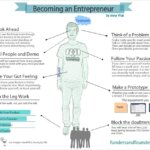One of the joys of being in Business School, is that you encounter many entrepreneurs and business owners with great businesses. Many of these businesses are incredibly viable, scalable and even largely successful. However, the greatest joy lies in listening to the way they project and speak about their businesses and how they were conceived. Usually, it is with such passion, vigor and clarity that it seems as if these businesses were their natural calling. From this perspective, their associated success and growth seem entirely understandable and maybe even inevitable. For many of us, however, the big question remains: how do we come up with a great business? More specifically, how do we come up with great business ideas? Through my experiences of speaking with many great entrepreneurs that I had the pleasure of meeting and drawing on my own experiences as a committed entrepreneur, I believe we can identify 3 primary ways to come up with business ideas that have the potential to become truly great.
Identify Needs
Many great businesses address the real needs of consumers at large and as such, offer immense value to the marketplace. With this understanding, in forming our own business ideas we can spend some time critically considering what is actually needed. Under this process, we critically survey and examine, what is lacking in the marketplace, difficulties faced by consumers, and other unaddressed consumer needs. By doing so, we can begin to identify a valuable business idea and its operational characteristics. Such an analysis would also allow us to formulate core strategies for its execution and development. Unfortunately, a lot of entrepreneurs tend to overlook this process. Often, they are driven by general assumptions as to what consumer’s need and want, rather than an actual comprehension of the facts. Not surprisingly, many of their startup ideas flop and do not garner the desired traction.
Identify Your Skills
Starting a great business requires serious introspection. What is meant by this, is that you should reflect on your own skills, experiences and the core competencies that you’ve developed through the years. This involves asking yourself questions such as: “What skills do you have?”, “Do you have an immense wealth of experience in certain things?”, “What am I good at?” Having a firm grasp of your own core competencies is very important because they could very well become the basis of a great business. The logic is very simple, we can create much more value by doing what we are good at. Therefore, sometimes the secret to creating a great business requires us to consider what we are truly good at and ultimately, whether we can adapt any of those skills into a business. This is certainly evident with many great entrepreneurs, whose startup ideas were really manifestations of their own developed competencies and abilities.
Identify Your Passion
An often overlooked aspect of business ideation is passion. Passion is that compelling emotion that underlies the personal drive which naturally motivates us to do our best. Indeed, many great startups are helmed by passionate entrepreneurs, who live and breathe their business idea and philosophy. Passion itself can and should be an active component in one’s thinking process when they are considering businesses ideas. This is because countless comparative research studies have shown that entrepreneurs whose ventures stem from their true passions often achieve better results. With this in mind, when coming up with a business idea, we could examine our own passions as the fundamental starting point. This involves asking ourselves, what we really love and what interests us the most. From our inner understandings here, we can begin to discover the types of businesses that we could pursue and more often than not, our passions here will enable us to enthusiastically and naturally commit to the businesses’ continuous development and growth.





























